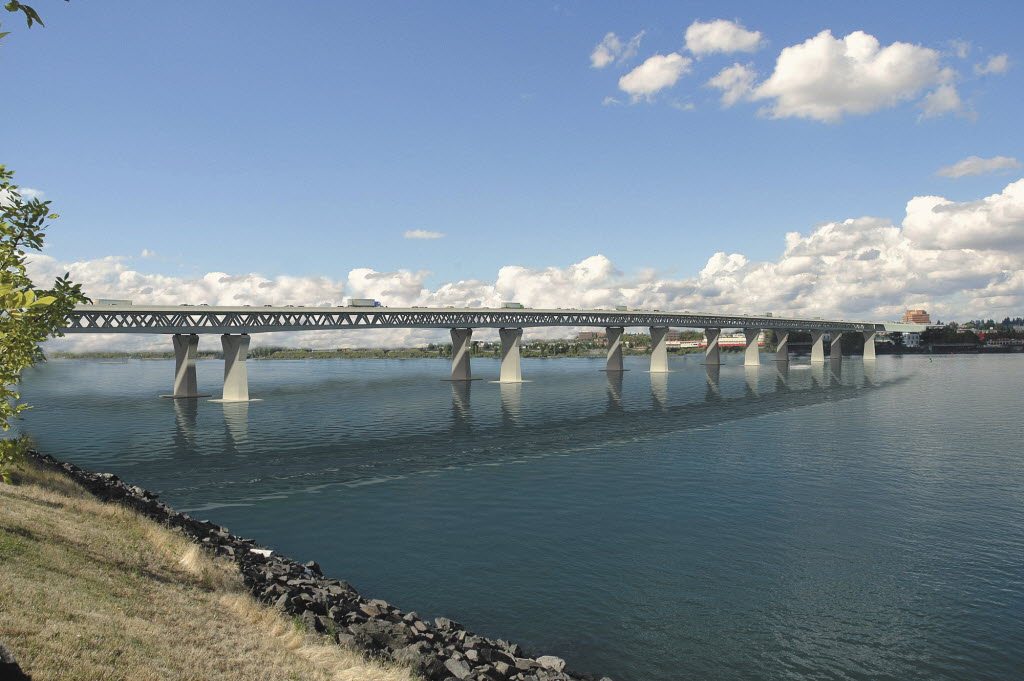See bottom of story for video of interview with Paula Hammond, Washington state secretary of transportation.
Transportation agency defends work on CRC
State transportation officials this week defended their work on the Columbia River Crossing, firing back against criticisms raised last month in a detailed report by Vancouver forensic accountant Tiffany Couch.
Couch had questioned the accountability, transparency and financial practices surrounding the $3.5 billion megaproject. But in its rebuttal sent to state lawmakers, the Washington State Department of Transportation said planners have adapted to a complex, evolving process — following normal state and industry practices in securing federal approval of the project last December.
“I want you to know that I take these assertions very seriously,” state Secretary of Transportation Paula Hammond wrote in a letter introducing the nine-page report. “Good government, accountable and transparent government, has been a cornerstone of WSDOT since I became secretary, and I’m proud of the way we do business.”
Focus on task order
WSDOT’s response went into detail on several points raised by Couch. But the rebuttal didn’t quell lingering concerns held by some lawmakers in Olympia.
The CRC project would replace the Interstate 5 Bridge between Washington and Oregon, extend light rail into downtown Vancouver and rebuild the freeway on both sides of the Columbia River. The project has spent more than $140 million in planning to date, with construction not expected to start until at least 2013 — likely later.
Much of Couch’s report focused on the process that’s steered the lion’s share of that money to lead contractor David Evans & Associates and its subcontractors. She also highlighted a specific task order that was repeatedly changed, then restarted as a new task, adding millions of dollars to the original amount.
WSDOT said this week the initial task order — intended to publish the project’s final environmental impact statement and get federal approval in 2009 — started before CRC officials knew how much public engagement and technical analysis was needed. So the job was halted and “zeroed out,” starting fresh with a new task order and a new budget in 2010. The idea was to provide additional clarity for project owners and consultants, according to WSDOT.
The two jobs ran up a combined cost of more than $55 million. Both went more than 50 percent over their original budgets, according to project documents.
WSDOT also spelled out the financial burden carried by each state so far, after Couch noted that Washington has chipped in a higher amount than its southern neighbor. That’s true — but not unexpected, according to WSDOT. What’s more important, the agency said, is that the Washington and Oregon shares even out in the end.
“At the conclusion of the project, any remaining discrepancy will be reconciled, according to the states’ signed agreement,” the report read.
WSDOT has committed more than $102 million to the CRC to date, a little more than half of that being funds the state received from the Federal Highway Administration. The Oregon Department of Transportation has committed about $90 million. But with almost $80 million of that listed as FHA funds, it’s also seen a much bigger chunk passed through from the feds.
Tough pill to swallow
In an interview, Hammond said the CRC has received unprecedented attention — from both critics and supporters — and this week’s report keeps planners’ efforts out in the forefront. The Washington Legislature’s recent authorization of tolling only adds to the CRC’s momentum, she said. Hammond even identified Rep. Ann Rivers, R-La Center, as someone who’s taken on a “leadership role in making sure this project happens.”
Rivers, however, seemed slightly perplexed by that characterization.
“I remain very, very concerned about this project,” Rivers said. “If the leadership she’s referring to is getting protections into the bill like no tolling on (Interstate) 205, a legislative oversight committee, and capping the (price of the) project … my leadership is about protecting my people.”
CRC planners have said the changing contracts and spending levels are expected for a project of such size and complexity. WSDOT’s report this week reiterated that stance.
That’s helpful to know for lawmakers learning about the process in Southwest Washington, said Rep. Paul Harris, R-Vancouver. But it’s a tough pill to swallow for residents who aren’t privy to the public arena.
“In the private sector, we would never do anything like this,” Harris said.
Rivers and Harris both said the CRC office could have been more open to Couch at the outset, and avoided some of the accounting and transparency concerns that have followed the project since. State officials have said an antiquated computer system caused delayed responses to public records requests by Couch, who was hired by Vancouver businessman and CRC critic David Madore to comb through the project’s finances. That issue should have been addressed and explained sooner, Harris said.
Harris said the region needs a new Interstate 5 Bridge. But he still worries about other Portland-area bottlenecks that routinely stack up freeway traffic. If those aren’t fixed, a new bridge may not be enough to relieve congestion, he said.
“It’s kind of like having a great heart, but all our arteries are clogged,” Harris said. “I would unclog the arteries first before I put the heart in.”
Couch said in an email she didn’t see WSDOT’s rebuttal to her presentation until Wednesday night. She spent Thursday in Salem meeting with clients and Oregon legislators, and didn’t have time to respond fully. But Couch welcomed the rebuttal.
“I’m pleased that WSDOT has taken the time to respond to my white paper and the comments I made during a legislative hearing in Olympia last month,” Couch wrote. “When Government responds to valid concerns, it is always a good thing.”
Eric Florip: 360-735-4541; http://twitter.com/col_enviro; eric.florip@columbian.com.
Reporter Andrea Damewood contributed to this story.




